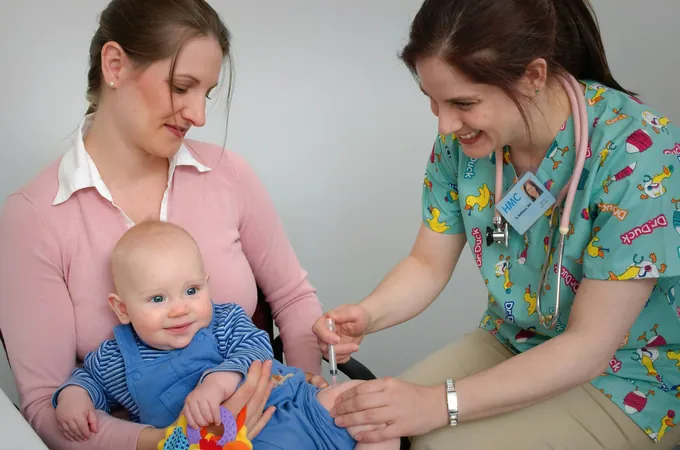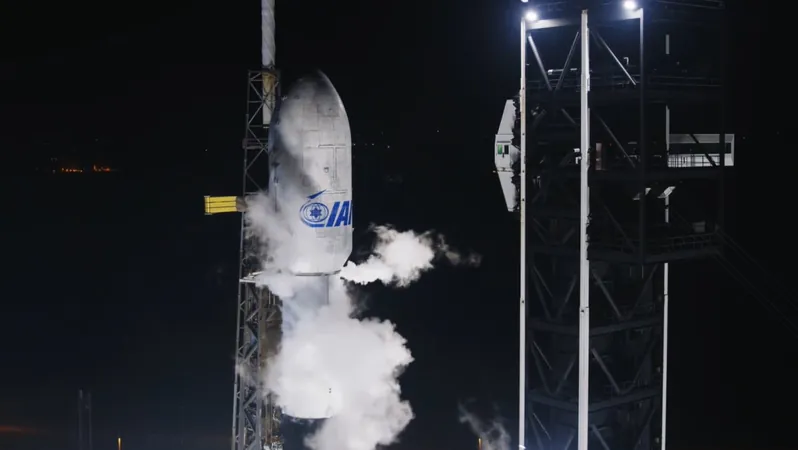
Is The Key to Stopping Measles Outbreaks an Earlier Vaccine?
2025-05-29
Author: Siti
Global Measles Crisis Sparks Call for Earlier Vaccination
Amidst a growing global outbreak, health experts are urgently debating whether the measles vaccine should be administered earlier, potentially offering better protection against this extremely contagious disease during infancy.
A comprehensive review led by the Murdoch Children's Research Institute (MCRI) reveals a staggering statistic: only 30% of babies in low- and middle-income countries retain maternal antibodies by the age of four months. This raises alarms, as it falls well short of the World Health Organization’s (WHO) recommendation for the first dose, which is typically advised between 9 to 12 months.
The Current Vaccination Landscape
The WHO recommends a two-dose measles vaccination schedule for all children: the first dose at nine months and the second between 15 to 18 months. However, in outbreak scenarios, an additional early vaccination at six months is suggested.
The study, published in The Journal of Infectious Diseases, reviewed data from 8,000 infants under nine months in low- and middle-income regions, highlighting a rapid decline in maternal antibody levels—from 81% at birth to a mere 30% by four months.
A Glimmer of Hope: Early First Doses
Dr. Lien Anh Ha Do from MCRI emphasized the need for an early first measles dose. Her findings indicate that when the first vaccine dose is given between four and seven months, it can trigger a robust immune response, effectively guarding against the disease.
"With 70% of babies without measles antibodies by four months, they are left vulnerable before reaching the vaccine-eligible age," she noted, advocating for either an earlier first dose or the introduction of an extra early dose into the existing vaccination schedule.
Challenges on the Path to Protection
However, Professor Kim Mulholland from MCRI cautioned that implementing earlier vaccinations could face significant hurdles. These include the cost-effectiveness of additional doses, tackling vaccine hesitancy, and concerns that early vaccinations might diminish long-term efficacy.
He highlighted the importance of preventing infections during childhood to curb the spread of measles, as school-aged children are major virus transmitters. Achieving herd immunity requires at least 95% of the population to be fully vaccinated—a daunting task, especially after the setbacks caused by the COVID-19 pandemic.
A Dramatic Increase in Measles Cases
The urgency of this discussion is underscored by alarming statistics: nearly 400,000 measles cases have been reported worldwide in 2024 alone, with over 16,000 cases recorded in just the first two months of 2025. In many countries, inadequate vaccination coverage has triggered large outbreaks.
Innovative Solutions for a Global Health Crisis
MCRI Associate Professor Claire von Mollendorf called for innovative strategies to confront the ongoing measles epidemic. "Global control measures have stagnated over the past two decades, and the situation is poised to worsen," she warned.
New Zealand has already taken a proactive step by recommending an additional measles vaccine for children as young as four months prior to travel to regions where the disease is prevalent.
Experts believe rapid diagnostic testing can significantly enhance outbreak surveillance and monitoring, while randomized controlled trials for earlier vaccination schedules could provide a lifeline for infants inadequately protected by existing maternal antibodies.


 Brasil (PT)
Brasil (PT)
 Canada (EN)
Canada (EN)
 Chile (ES)
Chile (ES)
 Česko (CS)
Česko (CS)
 대한민국 (KO)
대한민국 (KO)
 España (ES)
España (ES)
 France (FR)
France (FR)
 Hong Kong (EN)
Hong Kong (EN)
 Italia (IT)
Italia (IT)
 日本 (JA)
日本 (JA)
 Magyarország (HU)
Magyarország (HU)
 Norge (NO)
Norge (NO)
 Polska (PL)
Polska (PL)
 Schweiz (DE)
Schweiz (DE)
 Singapore (EN)
Singapore (EN)
 Sverige (SV)
Sverige (SV)
 Suomi (FI)
Suomi (FI)
 Türkiye (TR)
Türkiye (TR)
 الإمارات العربية المتحدة (AR)
الإمارات العربية المتحدة (AR)